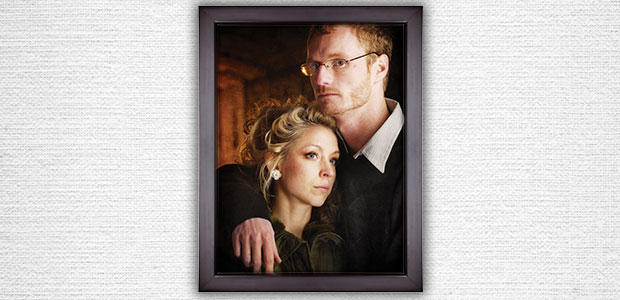Advertisement
When a Loved One Has Cancer
How to lend a helping hand

After he turned 50, Gerry Gramek recalls some of his friends urging him to get screened for colorectal cancer. Gramek brushed off the idea of that routine testing; he was healthy and busy with his work as a realtor. He never imagined he’d end up facing that very diagnosis five years later.
“I went to my doctor because there was dark blood in my stool,” Gramek says. “I had a colonoscopy and was told I’d hear back in seven to 10 days. But three days later, I got a call at 10:30 in the morning saying I needed to be at the doctor’s office at 1:30 that same day. At that moment I knew it was cancer. I just knew.
“It was terrifying,” he adds. “My father died of cancer. That was my frame of reference: you get cancer and you die.”
Nearly four years ago, he had surgery to remove part of his colon, and today he’s feeling well. He says he was fortunate to have a strong support network throughout his illness and recovery. But he admits it was hard at first to ask for help. And he quickly learned that in some cases, it was just as hard for people to know what to do or say to assist him.
“I needed peace, and there were times when I just couldn’t answer the phone,” Gramek says. “For my body to heal, I needed to sleep. Some days I’d get up, have breakfast then feel tired, so I would go back to bed 15 minutes later. I needed to be forgiven for not getting back to people.”
How to help
Should you send flowers or food? Give someone space or increase your contact? It’s natural for people to feel motivated to help a loved one with cancer yet be unsure of exactly how.
“It’s a common human emotion to want to help,” says Dr. Hal Gunn, co-founder and CEO of InspireHealth, Canada’s only publicly funded integrated cancer care centre. “So often, people wish they could do more. The simple capacity to be present for people going through cancer is one of the most important steps you can take. Just to let them know that you’re there and available is really powerful.”
To back up the power of saying “I’m here for you”—and really meaning it—Gunn points to a study published in Breast Cancer Research and Treatment that examined the role of social support on women’s prognosis. Involving more than 2,200 breast cancer patients, the 2012 study found that those with small support networks and low levels of support had a significantly higher risk of mortality than women with large networks and high levels of support. So the quality of relationships mattered just as much as the quantity.
“Having people to talk to during a challenging time is so important,” Gunn says. “Just be there to listen.”
Talking truthfully
There are ways to handle difficult topics with tact and compassion. If there’s a delicate subject you need to bring up, the Canadian Cancer Society suggests asking if it’s a good time to talk first. If you’re nervous, try practising what you’re going to say in advance. Keep in mind that matters don’t necessarily need to be solved in one chat; subjects can be revisited. What’s crucial is being sincere.
Talk doesn’t always have to be serious, though, nor should it be. Gramek says he craved hearing about the latest news or what was happening with other people.
“It’s so important to hear the normal parts of life,” Gramek says. “We want normal, because that’s not what we’ve got. Once you’re diagnosed you become the centre of your universe; I needed to turn my eyes back out. The best way for me to do that was having friends tell me what was going on in their lives or what their summer plans were or what they heard on the radio.
“As soon as you’re diagnosed, there’s a sense of aloneness,” he adds. “I felt isolated from the rest of the planet. For my recovery, I really needed to hear the banal side of life.”
Respecting others’ choices
It can be hard to keep opinions to yourself—maybe you feel your loved one should be trying another form of treatment, for instance, or going about his recovery differently. But it’s important to remember that decisions are hers to make. Gunn cautions against preaching health advice.
“People with cancer can feel overwhelmed,” Gunn explains. “If they ask somebody to explore certain things for them—maybe other forms of treatment—because they don’t have the time or energy to do research, then that can be really helpful. Otherwise, hold off.
“It’s important to recognize that as humans, we can’t take responsibility for someone else,” Gunn adds. “It’s their journey. We can provide compassion, but we can’t take that journey for them.”
To be a strong source of support, people need to tend to their own mental, physical, and emotional well-being too, Gunn reminds. That includes letting go of feelings of guilt that it’s not you battling cancer. “The best thing you can do is take care of yourself,” he says.
Dealing with daily life
While open, honest dialogue is paramount, so is offering practical assistance. To be truly effective, phrase your offers of assistance carefully. Instead of saying, “Let me know if I can help,” be specific and try offers such as “I’m going grocery shopping today. Is there anything you need?” or “I have a couple of hours this afternoon when I could come over and do laundry and some cleaning.”
“Good ways to support people dealing with cancer are to help with day-to-day things,” Gunn explains. “Offer to help drive them to appointments, to make healthy food for them, or to go for walks with them. The more detailed the better.”
Social media sites can be a great tool for organizing everything from rides to meal drop-offs. Those with cancer can be involved as much or as little as they wish. The same thing can be done via a “phone tree,” where one person takes charge of passing along messages to others.
Any loving gestures that make a person’s life easier are usually welcome, even if he’s reluctant to ask for help.
“I needed to minimize stress in my life,” Gramek says. “I also wanted to be included in life events. I wanted support, not pity.”
Talking to children about a cancer diagnosis in the family
One of the most heart-wrenching things an adult can do is break it to young ones that someone they love dearly has cancer. With these tips in mind, you can talk to kids openly while handling their feelings with care.
- Recognize that every child will have a unique reaction. They may be scared, angry, or overwhelmed. They might feel responsible or guilty. They may have trouble sleeping, doing homework, or eating. They might be especially clingy or needy.
- Ask open-ended questions instead of yes or no questions. Doing so can help get kids to describe what they’re thinking.
- Find “together time.” Look for special, quiet moments to connect with your child: maybe it’s sitting with her at bedtime, going for a walk, or sharing a favourite snack. A little uninterrupted time goes a long way.
- Be honest. Kids deserve to know the truth, even if the prognosis is poor. Talking about death and other hard subjects may be difficult, but not talking about them is worse.
- Seek other sources of support. Make sure your little one has time for play dates, and if she’s close to other adults, ask them to help out. Be sure teachers, coaches, and school counsellors know what’s going on so they can offer support too.
- Contact the Canadian Cancer Society or your provincial cancer agency for child- and family-centred support groups.





